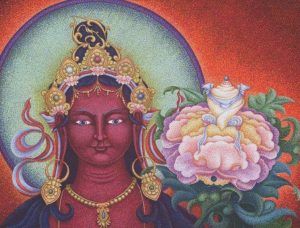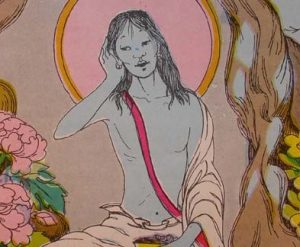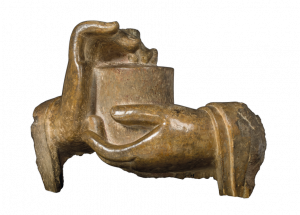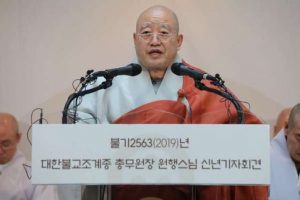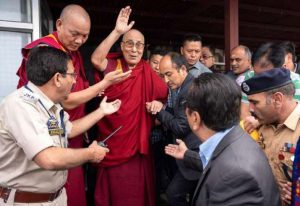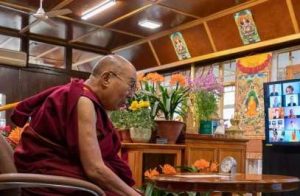Editor’s note: Eric Johns is a lay Buddhist who was born in North London in 1955. He left school at 14 and made handcrafts for a living while travelling with horse drawn gypsies until the age of 28. He became a Buddhist through martial arts at 17. But the turning point came when he read about Master Xu Yun when he was 20. In the February of 1984 he went to live on Lantau Island in Hong Kong, so he could learn from Master Xu Yun’s students. The late Ven. Sheng Yi ordained him and he was a monastic for over three years, but since disrobing he has run Chan meditation groups in London & Banbury, and now at Precious Wood Hermitage in Wales UK, which he built (See attached photo and more on Facebook).
Once again he makes hand crafts for a living near his hermitage, while travelling to China to widen & deepen my practice most years. He chose Chinese Chan Buddhism because it is vegetarian and can help us all live at ease with the world and ourselves. With such a special and unusual story behind him, it is with great pleasure that we present, with his approval, his journals of his trips to China.
Visit his website at Empty Cloud.net.
Saturday, 27th October
Samantha and I arrived at Shanghai airport at 9.30am. We met our friend He Hui at Hongqiao railway station a couple of hours later. She had reserved train tickets which we collected, and then we went downstairs to eat in a Japanese-style noodle restaurant. He Hui asked the waitress for plain noodles and vegetables without onions, garlic, MSG or meat/fish stock and no eggs. The incredulous waitress asked why we wanted such tasteless food. We explained about being Buddhist, then hot noodles soon came. But the vegetable dishes were covered in garlic so we sent them back. New clean vegetable dishes soon arrived and everybody, including the stressed pushy waitress, seemed happy.
We then took the seven-hour train to Nanchang together, arriving at 9.30pm, where Master He Dong was waiting with He Han (Miss Lee). She drove us to our nearby hotel. The five of us sat up until 1.30am drinking tea and chatting. He Han is doing her Major in Japanese and was keen to practise it with me, as Master Dong had told her I could speak some. Miss Lee and Master Dong always sat in full lotus for long periods. They sat upright and did not lean around much.
Sunday, 28th October
We woke up feeling good at 5am. Then at 6am we saw people outside in a small park doing Tai Chi and we went and joined them. Old people there were selling second hand goods. Then we all went to a large vegetarian breakfast together in the hotel. Miss Lee had hired a mini bus owned by her friend and driven by his nephew, Shao Fu. Straight away we set off to Lu Shan. One hour later, arriving at the Mountain Gate, she got us free passes in as her father was the governor of tourism on the mountain and everybody there seemed to know her. We drove on up the mountain following He Han in her car at breakneck speed around the numerous hairpin bends for around 40 minutes. At the top is a town that the Chinese call a ‘mini city’ named Gu-ling where we checked into an expensive hotel. (They are all expensive up there.) Miss Lee had paid for all of us. We had been successfully and willingly kidnapped for one week. Next door was a simple local restaurant where the five of us ate local mountain vegetables and rice for lunch. Jiangxi food is very spicy.
Afterwards we went for a hike around the mountain. Miss Lee got us through the trail entrance for free and we walked along the mountain path. The views were simply stunning, just like the famous Chinese landscape paintings.
Soon we reached the ‘Cave of the Immortals’, where we saw a relatively new Taoist tourist temple. Then later, back at the hotel, came the explanation for the kidnapping. Miss Lee explained that she was the General Manager of a cultural education programme. Chan teaching was a part of this, alongside a lot of other Chinese cultural themes. She said that in Anhui in a few days there would be an opening ceremony for that branch, one of five branches operating nationally. Hers was the Beijing branch. She then asked if I could give a talk – she could translate. We used a mixture of Japanese, English and Mandarin to communicate and I guessed she would earn her Master’s in Japanese next year. He Dong told me that Miss Lee is very rich and, apart from her top job in Beijing running the culture academy project, she runs three travel companies from Lu Shan. She told me she sat up until 3am every night working and studying and had done so since childhood. This is because, as a young girl, she went out in the winter and got frostbite in her little fingers, so her parents kept her in from the cold so she had started to study every day.
Lu Shan is a place that has attracted philosophers and monastics for a very long time. Master Hui Yuan founded the Pure Land School of Buddhism here at Dong Lin Monastery in the 4th century. China’s first famous landscape painter also lived there in the 4th century. But the most important things on Lu Shan were destroyed in the mid -19th century’s Tai-ping rebellion. After the destruction, the Missionaries arrived and rebuilt Gu-ling. After that the Communist party used these European-styled villas to hold social events and conferences in.
That evening we went to another restaurant and ate a simple meal of mountain vegetables. Then we went for an amazing foot massage – there were many in town waiting for the foot weary like us.
TO BE CONTINUED…






